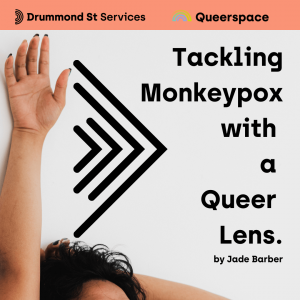Tackling Monkeypox with a Queer Lens

When I first heard about monkeypox, my reaction was one of apathy: “Oh great, another virus.”
I actually chuckled. It was one of those ‘if you don’t laugh, you’ll cry’ moments.
We can be forgiven as a population for having this reaction. After years of Covid lockdowns, arguments, press conferences, infection control and worry, it would be hard to imagine anyone who isn’t feeling a little burnt-out by viruses, especially in Naarm.
Those of us in the queer community, however, do not have the privilege of apathy. Our conversations about Monkeypox are practical and essential: we know how to get information out and support our communities, and we are preparing.
At the time of writing, Victoria’s Monkeypox outbreak has grown by 20 cases in one week. Government officials say cases will continue to rise rapidly until large numbers of vaccines arrive.
Generally speaking, Mokeypox isn’t as dangerous as Covid-19, however it can be deadly. Possible symptoms include sepsis, brain swelling and blindness. It can also be excruciatingly painful and is extremely contagious.
So far, all the mainstream media coverage I’ve seen has described men who have sex with men as the group at risk. This is not untrue, however it doesn’t paint a complete picture. I don’t believe it’s possible that only one subset of the queer community can be affected.
Being in the spotlight isn’t always a privilege – and this is not the first time queer men have been front and centre. Historically, nearly every major event in queer history – positive and negative – has has centred on queer men and left out the other identities and sexualities that co-experience these events.
This often leads to a lack of information around the diversity of the LGBTQIA+ community and it’s needs, as well as insufficient support and recognition to many who form part of it. I believe that in order to manage the outbreak as effectively as possible and target those most at risk, efforts must include and account for all LGBTQIA+ identities, as well as intersections such as race, culture and disability.
Safe and easy access to treatment and accurate health advice is essential to tackling Monkeypox, and will help everyone, not only those of us who are queer. Reducing stigma and increasing awareness means more of us feel safe enough to get a vaccine, which will help to slow or stop it spreading to populations outside of the queer community. Of course, viruses do not only target one gender or sexuality, and monkeypox is not an STI – any person can be catch it though close contact with an infected person.
Targeting Those at Risk
Among my social circles, I am the only non-man I know who has received a Monkeypox vaccine. For all I know, I may be one of the first women in Australia to have received it.
At the time of writing, in Victoria, eligibility has just been expanded to trans people. This differs from the health advice being given federally, which suggests the vaccine should only be given to men who have sex with men. The same government website lists the risk factors as being: “People who have had close physical contact with an MPX case, and Australian travellers returning from, or going to, countries with confirmed cases.”
This broad brush-stroke approach seems familiar to many who have interacted with federal government medical and community systems, and there were concerns that gender diverse people and sex workers were not being protected.
There was some acknowledgement of this by the Victorian government, hence the updated guidelines, which have been expanded to AMAB (assigned male at birth) trans/non-binary people, and sex workers.
I feel grateful to have access to the vaccine, as I genuinely need it – I have multiple partners, which including queer men. I’m certain there are many others like me who are ineligible and at risk.
Even in Victoria, where is the protection for cisgender or AFAB people who have sex with men? What’s to say a woman with multiple male partners is less at risk than a gay man in a long-term monogamous relationship?
It makes me uncomfortable that the vaccine is only available to AMAB trans people. It certainly made me uncomfortable in the waiting room at the doctor’s office. In my experience, the terms AMAB and AFAB are primarily used in the queer community to speak to framing one’s upbringing or experience before they transitioned, and how this affected their journey. I don’t refer to others in this way and in most cases, I don’t like to be categorised by my sex assigned at birth.
Disclosing I am AMAB not only means outing myself, it also alludes to the trans experience being performative. My gender is real, and I am a real woman, thank you.
I’ve not seen any evidence to suggest Monkeypox affects bodies with different reproductive systems differently, and if it does, someone needs to express this directly. Dividing up the queer community using hard boundaries causes issues and inaccuracies, because we define ourselves with fluidity and use language in ways that mainstream communities do not.
I believe this approach shows a fundamental misunderstanding of the LGBTQIA+ community, particularly those of us who are gender diverse and/or trans.
Of course, knowing that men who have sex with men are the main group that has been affected so far is important. You may forgive me, however, for being suspicious of how accurate this data is. After all, we only recently took part in a census that was actively designed to exclude data on gender diversity. Self-reported data and birth records also hold the possibility of being inaccurate due to stigma and barriers towards gender affirmation.
My concern is that unless information is put out acknowledging that other members of the queer community are at risk then many of us will underestimate the threat of being infected and the measures we need to take.
So how do we define who is eligible for the vaccine, with the knowledge that there may not be a clear picture of which genders are being affected? Could it be as simple as targeting “LGBTQIA+ people who are sexually active with multiple recent sexual partners and/or attend sex-on-premises venues and/or engage in sex work”?
There is a trope of queers being impractical or sensitive, however my experience has been that LGBTQIA+ people are very practical and will react appropriately in times of crisis, as is the case with many marginalised populations. We don’t need you to sugar coat or shy away from which sub- groups are at risk, however there needs to be acceptance of fluidity in how we manage those risks. Understanding and supporting gender expression and fluidity is an essential part of supporting queer populations, and community-run organisations put effort and care into orientating support to where it is needed without the use of hard boundaries. This yields real change, and I believe it’s something mainstream heath supports could learn from queer-informed practice.
Stigma
If there’s one thing we learned from Covid-19, it’s that misinformation laced with fear can be a lethal combination. This isn’t the first time stigma has led to vilification and hatred of the LGBTQIA+ community. Already, here in Australia, there have been comments made by media personalities vilifying and stigmatising queer men and referencing tired, unfounded tropes about viruses and hygiene. It’s an easy target, and it will take understanding and education for the general public to talk about a virus that causes genital sores with maturity.
As I’ve spoken about before, these public attacks can cause deeper, more organised hatred by giving confidence and an audience to fringe anti-LGBTQIA+ groups, who have already jumped on the opportunity to push hate speech around monkeypox.
My concern is that, if left unchecked, misinformation and hate speech may cause many people to not engage with appropriate health supports when affected for fear of persecution, including people outside of the queer community.
There have already been many people who have shared their stories of contracting the virus and/or getting vaccinated on social media, and these people need to be supported to share their stories. Communities also need support to tackle hate speech and potential misinformation, and to enable communities to trust that they can seek support and healthcare safely.
Many queer people who are also sex workers, drug users, people of colour and/or people with a disability also have intersections that place them at higher risk of stigma, as well as a higher likelihood of rightly mistrusting government and medical systems.
During Covid we worked with community leaders of these groups to put out messages and promote information for these vaccines. We need to do the same for Monkeypox, and this also means tackling stigma to help these people feel safe, while making vaccines accessible to these groups.
The queer community has demonstrated an effective and practical response to Monkeypox so far however we require support, understanding and flexibility to succeed. Circumstances and beliefs have changed since the AIDS crisis, and it would be inappropriate to compare our current situation to the magnitude of hatred and negligence that survivors of that era went through.
I do hope, however, that as a community we can learn from our mistakes. I would like the way Monkeypox is handled to be seen as a marker of progress made in understanding, accepting and learning from LGBTQIA+ communities.
Please go to https://www.health.vic.gov.au/








Comments are closed.